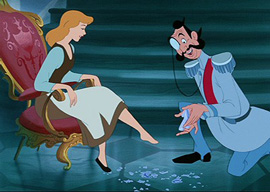
October 16, 2011

Your friendly neighborhood feminists—in a book I refuse to name—want to blame fairytales such as Cinderella for creating unrealistic expectations in American women. Why all the rancor, feminists, over not having a penis? Some of my favorite women don’t have a penis.
Feminist sensibilities have brought us heroines such as Samantha on Sex and the City: materialistic, self-obsessed, defined by work and, oh yes, someone who abandons a man to find a more experienced male model.
The argument goes something like this: Women are seeking out divorce in record numbers because there isn’t enough husband material with Fabio hair, a noble steed, and a return address that simply says THE CASTLE.
Stories are the best way to teach. Even the transvestite hookers on Sex and the City understand that.
I’ll take Sleeping Beauty any day. At the end of her story she knows that our behavior has good and bad consequences that affect the people around us.
Like when I was eight and my best friend was a girl. We were destined to kiss one day; that much was obvious.
It happened when we were ten, playing in the fort/makeout palace in my backyard. She was wearing brand-new braces—they were the awkward, goofy ones, not the kind that a cheerleader makes into a sexy accessory. They made her feel self-conscious and homely and, frankly, I agreed with her. But the best romantic stories don’t only happen to beautiful women. They also happen to plain, pigtailed, freckled girls who make their living as tomboys.
I sucked it up in that moment, looking beyond her appearance, knowing it would be over quickly and she would be grateful the way a long-suffering husband is to his wife on alternate Tuesdays. When I kissed her, my tongue gently rolled over the metal that covered her teeth in one grand, awkward gesture.
I pictured it as a fairytale. Beauty and the Beast taught me that I—the miscast Beauty—could have pity on my tinsel-mouthed Beast. And so I did.